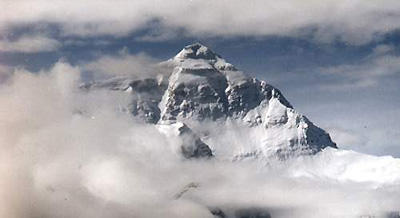
|
Media Bar
Ellen Sander's
|
Tuesday, July 12, 2005
It's not Mount Everest, it's Qomolangma
Thoughts from the Middle Kingdom on a shrinking lonely planet.
This is one of those expat moments that come to you after a while as you live away from your Western homeland and how the rest of the world sees it sinks in.  You may or may not be aware that there was a recent expedition to the top of the world's highest peak, situated on the border of Nepal and China, to remeasure its altitude, which may have changed because of environmental conditions. There were a score of Tibetan women on the team. What you may not know is the original and proper name of this peak is Qomolanga, not Everest. Qomolangma, named after the Tibetan mother goddess of the earth (varies with translation) was and is the name the Tibetan name that the Chinese use for the peak, which was charted with that name by the Chinese over 280 years ago, more than a century before the British "discovered it" and named it Everest. This 2002 article in People's Daily suggests the world get with the Chinese name of this planetary landmark and acknowledge the authenticity of its origin. Seems a reasonable request, considering. And it came to mind this week, as the data from the current expedition is being evaluated and the Chinese media observes the 600th anniversary of the seafaring expeditions of Zheng He's treasure fleets who's historic explorations may have, among other stunning accomplishments, preceded Columbus in the discovery of the Americas. I read a great (and controversial) book about this a couple of years ago, 1421, The Year China Discovered the World. I highly recommend at least poking around this website if not the hefty book itself (great summer reading). Members of a panel on the CCTV English Language show Dialogue, mentioned how in all Admiral Zheng's explorations, he never colonized the territories that he discovered, nor abused the natives such as Portugese explorer Vasco de Gama did, cutting off the noses and other body parts of the crews of ships bringing rice to Calcutta when Calcutta refused to surrender to his authority in the late 15th Century. However, an article a learned and China-wise colleague sent me today, China's warring Sinbad reinvented as good neighbour disputes that. Chinese lesson: Can you say "Cho-mo-lungma"? (Qomolangma) And try "Jung Huh" (Zheng He) Afterthought: The Nepalese name for this peak is Sagarmatha, which, upon some thought, is as original and legitimate a name as the Tibetan Qomolangma. It is not unheard of for mountains which straddle borders to be called different names by the different nations they occupy. The Alpine peak called the Matterhorn in Switzerland is known as Cervinia in Italy. (At the Cervinia ski resort you can take a chairlift up to a trailhead and ski down to Switzerland and vice versa.) But calling the world's highest summit by its British-given name is a slap at both cultures and in China particularly (or perhaps I sense it more emphatically because I'm here) it's a reminder of colonialism, an era they quite understandably don't recall fondly. |

Mainer, New Yawka, Beijinger, Californian, points between. News, views and ballyhoos that piqued my interest and caused me to sigh, cry, chuckle, groan or throw something.
Previous PostsGermany to open memorial to forced Nazi labor victimsChristian Rights and Wrongs Quote of the day Organs can be removed if you die abroad (not a hoax) Tears for London in the wake of cheers Hacking Plague in China Oh really, Bush? Great Blog! Open letters to GWB Getting Dooced Aw! No more anime or Disney on Chinese TV? Terror Alert Status LinksBaseball CrankThis Modern World The Peking Duck The Talent Show ESWN Simon World Angry Chinese Blogger Angry Chinese Blogger mirror Open Letters to GWB ArchivesWeb GizmoTechnorati ProfileSite Feed 
Search
|
||
 The text of this work is licensed under a Creative Commons License, except those items which are cited, which belong to their original copyright holders. The photos and cartoons belong to their original copyright holders. |